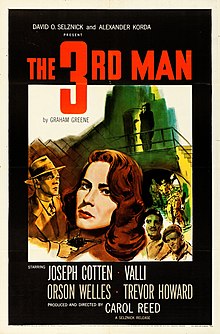
Back Alida Valli AN اليدا فالي Arabic اليدا فالى ARZ Аліда Валі Byelorussian Алида Вали Bulgarian Alida Valli Breton Alida Maria Altenburger Catalan Alida Valliová Czech Alida Valli Danish Alida Valli German
Alida Valli | |
|---|---|
 Valli in 1947 | |
| Born | Alida Maria Laura, Freiin Altenburger von Marckenstein-Frauenberg 31 May 1921 Pola, Kingdom of Italy (now Croatia) |
| Died | 22 April 2006 (aged 84) Rome, Italy |
| Other names | Valli |
| Occupation(s) | Actress, Singer |
| Years active | 1936–2002 |
| Spouse(s) |
Oscar de Mejo
(m. 1944; div. 1952)Giancarlo Zagni (m. 196?; div. 1970) |
| Children | 2, including Carlo De Mejo |
| Signature | |

Alida Maria Laura, Freiin Altenburger von Marckenstein-Frauenberg (31 May 1921 – 22 April 2006), better known by her stage name Alida Valli (or simply Valli), was an Italian actress who appeared in more than 100 films in a 70-year career, spanning from the 1930s to the early 2000s. She was one of the biggest stars of Italian film during the Fascist era, once being called "the most beautiful woman in the world" by Benito Mussolini, and was internationally successful post-World War II.[1][2] According to Frédéric Mitterrand, Valli was the only actress in Europe to equal Marlene Dietrich or Greta Garbo.
Valli worked with many significant directors both in Italy and abroad, including Alfred Hitchcock (The Paradine Case; 1947), Carol Reed (The Third Man; 1949), Luchino Visconti (Senso; 1954), Michelangelo Antonioni (Il Grido; 1957), Georges Franju (Eyes Without a Face; 1960), Pier Paolo Pasolini (Oedipus Rex; 1967), Mario Bava (Lisa and the Devil; 1972), Bernardo Bertolucci (1900, 1976; La Luna; 1979), and Dario Argento (Suspiria; 1977). Within her lifetime, Valli was invested a Knight of the Italian Republic, and received the Lifetime Achievement Golden Lion at the 1997 Venice Film Festival for her contributions to cinema.
- ^ Bernstein, Adam (24 April 2006). "'The Third Man' Actress Alida Valli, 84". Washington Post. Washington, D.C. Retrieved 22 September 2008.
- ^ "VALLI, Alida in "Enciclopedia del Cinema"". www.treccani.it (in Italian). Retrieved 19 October 2021.